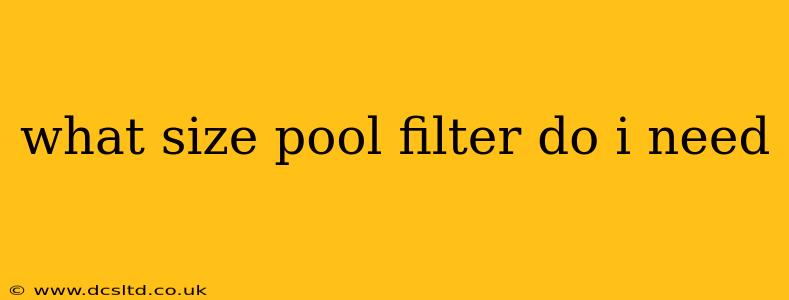Choosing the right pool filter is crucial for maintaining sparkling clean water and a healthy swimming environment. Getting the size wrong can lead to overworked equipment, poor water quality, and ultimately, costly repairs. This guide will walk you through the process of determining the appropriate filter size for your pool. It's not just about gallons; several factors play a vital role.
What Factors Determine Pool Filter Size?
Before we dive into specific numbers, let's understand the key factors influencing filter size selection:
-
Pool Size: This is the most obvious factor. Larger pools naturally require larger filters to handle the increased volume of water. However, it's not simply a matter of gallons; the pool's shape and depth also contribute.
-
Pool Type: In-ground pools typically demand more powerful filtration systems compared to above-ground pools due to their larger size and potential for higher debris accumulation.
-
Pump Flow Rate: Your pool pump's flow rate directly impacts the filter's capacity. A higher flow rate necessitates a filter capable of handling the increased water volume. The pump and filter must be correctly matched for optimal performance.
-
Number of Swimmers: More frequent use and a higher number of swimmers lead to increased contamination, requiring a more robust filter system to maintain water clarity.
-
Type of Filter: Different filter types (sand, cartridge, DE) have varying filtration capabilities and require different sizing considerations. Sand filters, for instance, generally need to be larger than cartridge filters for the same flow rate.
-
Climate: Pools in warmer climates, with more frequent use and potential for algae growth, may need more powerful filtration.
How to Calculate the Right Pool Filter Size: A Step-by-Step Guide
Calculating the precise filter size often involves consulting pool professionals or using online calculators specific to pool equipment manufacturers. However, a general guideline considers the pool's turnover rate. The turnover rate refers to how many times the entire pool volume is filtered within a 24-hour period. A good turnover rate is generally between 6 and 8 hours.
-
Determine your pool's volume: You can find online calculators that estimate pool volume based on dimensions (length, width, depth). Accurate measurements are crucial for this step.
-
Calculate the ideal turnover rate: Aim for a turnover rate between 6 and 8 hours. This means the filter should process the entire pool volume within that timeframe.
-
Calculate the required flow rate: Divide your pool's volume (in gallons) by the desired turnover rate (in hours). This gives you the required flow rate in gallons per hour (GPH).
-
Choose a filter with a compatible flow rate: Select a filter with a flow rate that matches or slightly exceeds the calculated GPH. Always refer to the manufacturer's specifications for your chosen filter.
What Type of Pool Filter Is Best?
The optimal filter type depends on several factors, including budget, maintenance preferences, and the level of filtration needed.
-
Sand Filters: These are cost-effective and relatively low-maintenance, offering good filtration for many pools.
-
Cartridge Filters: Provide excellent filtration and are easier to clean than sand filters, but they may require more frequent cleaning and replacement of cartridges.
-
DE (Diatomaceous Earth) Filters: Offer the finest filtration, resulting in exceptionally clear water. However, they require more maintenance and the disposal of DE, which is a naturally occurring substance.
How Often Should I Clean My Pool Filter?
The frequency of filter cleaning depends on several factors, including the filter type, pool usage, and the amount of debris present. As a general guideline:
-
Sand Filters: Backwash every 1-2 weeks, or more frequently if necessary.
-
Cartridge Filters: Clean every 2-4 weeks, or more frequently depending on use. Cartridges may need replacement annually.
-
DE Filters: Clean and replace DE as needed, typically every 2-4 weeks or more often depending on usage and water clarity.
What if My Pool Filter Is Too Small?
A filter that's too small will struggle to keep up with the required filtration demands. This can result in cloudy water, algae blooms, and increased maintenance. You might experience reduced efficiency from your pump as it works harder to push water through a restricted filter. In extreme cases, a too-small filter can lead to premature pump failure.
Ultimately, selecting the correct pool filter size is about finding the right balance between cost, performance, and maintenance. Consulting a pool professional is always recommended for personalized guidance. They can assess your specific needs and recommend the best filter for your pool's unique circumstances.
